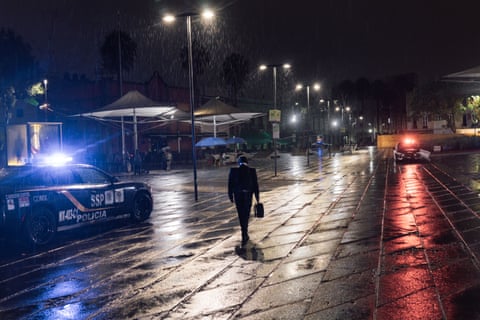The Mariachi musician is one of Mexico’s most best-known symbols and Plaza Garibaldi their home in Mexico City’s historic downtown, known as the Mariachi Mecca. Normally the plaza will have hundreds of tourists and locals present to see them perform. With the new government restrictions in place due to Covid-19, there are hundreds of jobless musicians vying for the work that may allow them to feed themselves and their families that day. Dozens of men wait on the main avenue stepping in front of traffic looking for clients.
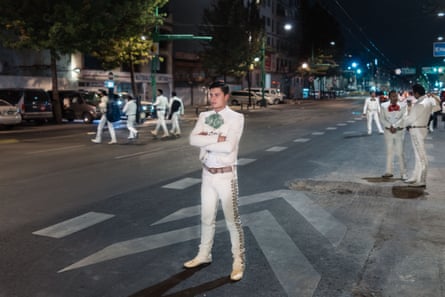
Jesus Méndez, 23, stands on the main avenue next to Plaza Garibaldi waiting to stop cars with other musicians, hoping to find a paying client. At times there are dozens of musicians here trying to stop passers by from about 6pm until 5am.
Ignacio Marcial has been singing in Plaza Garibaldi for 46 years. He recorded a few albums during his heyday in the 1970s and 80s. Today he spends most of his time in his hometown, about three hours from Mexico City, and comes in at weekends in the hope of finding a paying client to sing to.
Monica Rivera Zuñiga, 36, is a mother of two children and a third-generation mariachi musician. Her mother, who she lives with, is a nurse and has warned her to stay home. “I stayed home for two weeks, but saw all of my colleagues were still going out and decided the income was worth the risk,” she said.
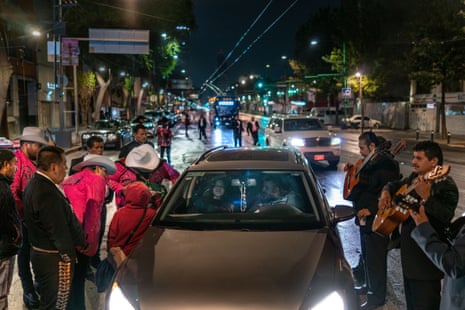
Mariachi play for clients in their car. Since Covid-19 restrictions started and clientele dwindled, they stand on the main avenue next to Plaza Garibaldi waiting to stop cars.
With the pandemic’s grip tightening on the city, one of the largest fears is the federal police physically removing them from Plaza Garibaldi. Each day rumours swirl as to when and how that will happen. The plaza represents the only place the Mariachi have any hope of earning an income and staying at home is simply not an option.
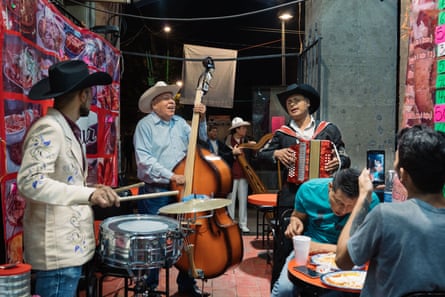
Two young men enjoy a hired mariachi band playing them music while they have a late-night dinner. It is the only small restaurant that remains open on Plaza Garibaldi since the pandemic restrictions came into place.
Ivan Plancote Marega plays Norteño music regularly at Plaza Garibaldi with his five-piece band.
Sergio Adrián Millán, 33, is a Norteño musician who regularly earns his wages at Plaza Garibaldi with his father and son.
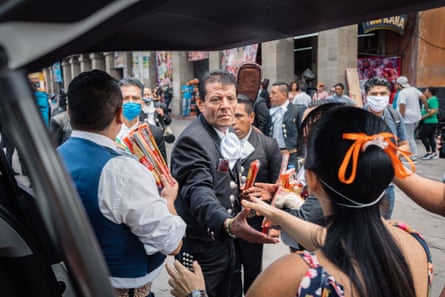
A Mariachi reaches to shake the hand of a volunteer distributing food and basic supplies at Plaza Garibaldi.
The Mariachi are part of approximately 60% of the Mexican population considered informal workers. In the current crisis, the informal sector represents those most vulnerable to the economic repercussions, with little or no access to government assistance. Local grassroots organisations, made up of largely low-income community members themselves, have mobilised collecting food donations to create rations. Food queues at Garibaldi are now a mix of Mariachi and the local homeless.
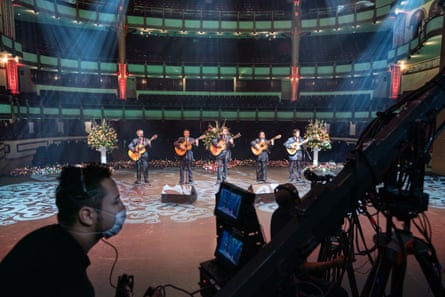
Mariachi musicians record a Mother’s Day special at the empty National Theatre in downtown Mexico City. Normally, Mother’s Day would attract large crowds to hear them serenade in Plaza Garibaldi.
The pandemic is challenging all societies around the world but none more than in developing countries. México’s people are humble and hard-working, generous and optimistic. These core values are what will guide people through the hard times ahead, and through the eyes of the Mariachi we watch the story unfold.
Brenda García, 23, is a mariachi singer who has played in a band with her father since she was 16. She has two daughters who live in her village, one-and-a-half hours each way from Plaza Garibaldi, where she works most days.
Gabriel Jimarez, known as “El Topo”, has travelled the world playing violin alongside famous musicians such as Rocío Dúrcal. He lived in Europe through the 1980s and decided to come back to Mexico to play at home. He now struggles to make ends meet, but thankfully had bought a home for his family in better times.
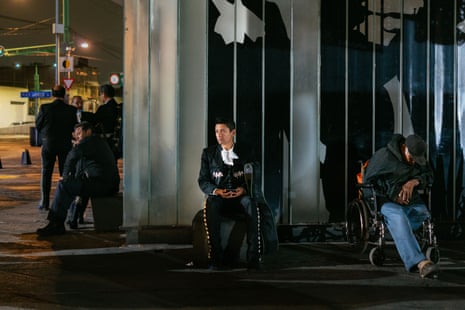
A Mariachi waits for the clientele at Plaza Garibaldi in downtown Mexico City.
